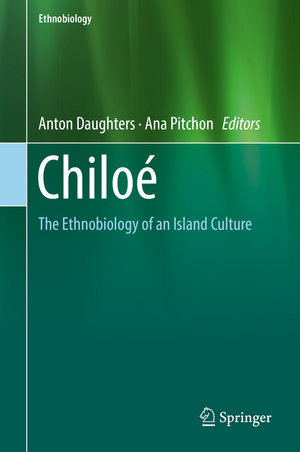Chiloé: The Ethnobiology of an Island Culture: Ethnobiology
Editat de Anton Daughters, Ana Pitchonen Limba Engleză Hardback – 16 iul 2018
| Toate formatele și edițiile | Preț | Express |
|---|---|---|
| Paperback (1) | 632.88 lei 6-8 săpt. | |
| Springer International Publishing – 21 dec 2018 | 632.88 lei 6-8 săpt. | |
| Hardback (1) | 638.89 lei 6-8 săpt. | |
| Springer International Publishing – 16 iul 2018 | 638.89 lei 6-8 săpt. |
Preț: 638.89 lei
Preț vechi: 751.64 lei
-15% Nou
Puncte Express: 958
Preț estimativ în valută:
122.27€ • 132.76$ • 102.70£
122.27€ • 132.76$ • 102.70£
Carte tipărită la comandă
Livrare economică 22 aprilie-06 mai
Preluare comenzi: 021 569.72.76
Specificații
ISBN-13: 9783319919829
ISBN-10: 3319919822
Pagini: 146
Ilustrații: IX, 131 p. 25 illus., 24 illus. in color.
Dimensiuni: 155 x 235 mm
Greutate: 0.38 kg
Ediția:1st ed. 2018
Editura: Springer International Publishing
Colecția Springer
Seria Ethnobiology
Locul publicării:Cham, Switzerland
ISBN-10: 3319919822
Pagini: 146
Ilustrații: IX, 131 p. 25 illus., 24 illus. in color.
Dimensiuni: 155 x 235 mm
Greutate: 0.38 kg
Ediția:1st ed. 2018
Editura: Springer International Publishing
Colecția Springer
Seria Ethnobiology
Locul publicării:Cham, Switzerland
Cuprins
Acknowledgements.- Chapter 1: Chiloé Today and over the Centuries.- Chapter 2: Local Knowledge, Local Networks and Successful Cooperative Mussel Aquaculture on Chiloé.- Chapter 3: Livelihood Diversification as a Form of Resilience? An Ethnographic Account of Artisanal Fishers in Chile’s Lakes Region.- Chapter 4: Food and Culture in Chiloé: Potatoes, Curanto, and Chicha.- Chapter 5: Trueque Chilote: Traditional Barter Networks Connect Nature and Society in Northern Patagonia.- Chapter 6: Seeing the Forest for the Trees: The Firewood Trade in Southern Chile.- Chapter 7: How Households Are Made: Marriage, Independence and Productivity on the Island of Apiao, Chiloé.
Notă biografică
Anton Daughters is an assistant professor of anthropology at Truman State University in Kirksville, Missouri. His field research in Chiloé focuses on the cultural changes that have accompanied economic shifts in the region over the past forty years. He received a BA in Anthropology from the University of New Mexico, a PhD from the University of Arizona, and a two-year Mellon Fellowship at Cornell College in Mount Vernon, Iowa. He has published in Anthropology Now, Journal of Latin American and Caribbean Anthropology, Kiva, and Journal of the Southwest, and is a co-editor of Moquis and Kastiilam: Hopis, Spaniards, and the Trauma of History, a two-volume documentary history of the Hopi published by University of Arizona Press.
Ana Pitchon is a researcher with the firm INSITUM Consulting. A former associate professor of anthropology at California State University Dominguez Hills and assistant professor at San Jose State University, she receiveda BA in Anthropology and Spanish from Colby College and a PhD in Ecological Anthropology from the University of Georgia. She has conducted research on fisheries and coastal communities in multiple countries, with a focus on social-ecological resilience. She has published in Human Organization, Journal of Latin American and Caribbean Anthropology, Journal of Anthropological Research, CalCOFI Reports and Urban Coast.
Ana Pitchon is a researcher with the firm INSITUM Consulting. A former associate professor of anthropology at California State University Dominguez Hills and assistant professor at San Jose State University, she receiveda BA in Anthropology and Spanish from Colby College and a PhD in Ecological Anthropology from the University of Georgia. She has conducted research on fisheries and coastal communities in multiple countries, with a focus on social-ecological resilience. She has published in Human Organization, Journal of Latin American and Caribbean Anthropology, Journal of Anthropological Research, CalCOFI Reports and Urban Coast.
Textul de pe ultima copertă
This volume focuses on the ethnobiology of southern Chile’s Archipelago of Chiloé. Chiloé presents a unique perspective on the intersection of society and biology owing to its vast natural resources, historic culture of cooperation, geographic isolation, and external resource exploitation. Contributions to this volume cover knowledge bases in both marine and terrestrial systems, and how specific local knowledge types contributed to a variety of strategies, including subsistence, social-ecological resilience, resource conservation, cultural heritage preservation, economic systems, and mitigating uncertainty. This book addresses the specificities of human-environment interaction on a resource-rich island, and how historic knowledge and practices can help configure adaptation to a changing social-ecological landscape.
Caracteristici
Discusses the dynamic and adaptive relationship between islander and sea as a result of the ecological and cultural impact of salmon farming on the archipelago Analyzes the ethnobiology of the potato in Chiloé and its role in islander culture Offers insight into alternatives to modern capitalist markets through patterns of cooperation developed out of a unique set of ecological and geographic circumstances













